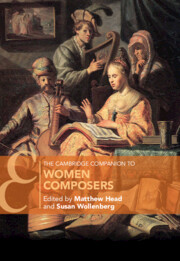Acknowledgements
We live in times when, if we switch on BBC Radio 3, we may find that we’re hearing (for instance, in the popular mid-morning slot) Alice Mary Smith’s beautifully scored Andante for Clarinet and Orchestra or, in the (also popular) breakfast slot, deftly and confidently written movements from symphonies by Emilie Mayer or Florence Price, all broadcast during May 2023. Or the ‘Composers of the Week’ may be Hildegard of Bingen and Isabella Leonarda (April 2023), or Pauline Viardot and Her Circle (June 2021). The widely read German encyclopaedia MGG Online announces the uploading of new articles as of April 2023 that include Florence Price and Margaret Bonds, while the also widely consulted Grove Dictionary (Oxford Music Online) features both Price and Bonds in articles published online in 2020.
These examples, among many others, reflect the ‘sea change’ in the representation of women composers within the Western cultural climate over the last few decades. Consideration of the journey that brought women composers of the past to this point in their history (and in the telling of that history) is accompanied in the present volume by the results of recent research shining new light on individual topics, drawn together in a series of chapters commissioned from leading scholars in the field.
We are enormously grateful to our contributors for their sterling efforts in producing their chapters during the time of pandemic, with all its pressures, and for their patience and diligence as our editorial work proceeded. We thank also most warmly the three contemporary composers who generously spared time to contribute their reflections to the epilogue: Nicola LeFanu, Roxanna Panufnik, and Shirley J. Thompson.
The present volume reflects not only the growth of scholarship on the subject, but also the questioning of received historical and systemic assumptions that process has generated. The Prologue outlines these developments, while some of the main themes arising from such questioning, and underpinning Parts II–IV, are explored in the chapters forming Part I. Although the chapters in Parts II–IV follow one another in chronological order, they are not designed to present any kind of continuous historical survey. Instead, the chapter authors share their expertise in selected areas of particular significance in the history of women composers, bringing to the fore composers’ lives and works, considered within the social, cultural, and institutional structures of their time.
This Companion complements The Cambridge Companion to Women in Music since 1900, edited by Laura Hamer and published in 2021. We are grateful to Laura Hamer for sharing information about that Companion during its preparation. Where that volume concentrated on a century or so of musical culture, covering a spread of different areas to which women contributed in a variety of ways, the present volume (its contents outlined in more detail in the Prologue) ranges widely across the centuries from medieval to modern times. While focusing principally on women’s contribution as composers to the ‘classical’ music repertoire, it recognizes that their compositional work often enmeshed with other strands involved in musical production, such as performance, improvisation, and adaptation of pre-existent material.
We have been grateful to all those who, knowing of our interest in women composers, have kindly shared with us, over the years, new information pertaining thereto, or issued invitations to participate in conferences on the subject. Gregory Burton and Rachael Seculer-Faber (Music Faculty Library, University of Oxford) gave invaluable assistance during the final stages of assembling the Bibliography. Kate Brett and her team at Cambridge University Press have given enthusiastic support from the moment when the volume was first proposed, and we have deeply appreciated their help and guidance throughout its progress. We thank most warmly our respective institutions, King’s College London and the Faculty of Music, University of Oxford, for their support of the project.
Catherine Adie (née Leach) gave life-changing music lessons to many students of flute, piano, and music theory in South-West Cornwall in the 1980s. As Head of Music at Withington Girls’ School, Manchester, from 1964 to 1988, Jean Fielden introduced her pupils to a wide range of repertoire, encouraging us to write music ourselves at a time when composition was not a standard element in the examination syllabuses. This Companion is dedicated to them both in abiding gratitude.

